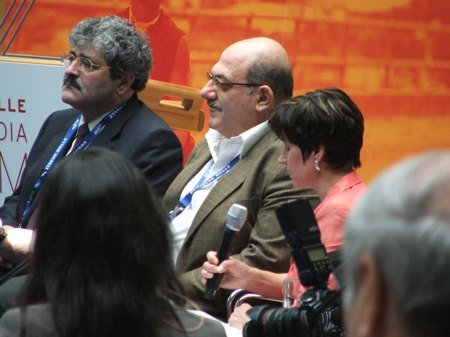
Aref Hijjawi (bald guy in the middle), who is a familiar name to those of us who listened to the BBC Arabic service in the last decade. He is now a program director at Al Jazeera.
Yesterday he was the dissenting voice at the Global Media Forum session entitled “Crisis prevention through media intervention”.
He said that the title of the conference in a “bit funny”. He said that media is about conflict and that life, in fact, is about conflict. “When there bullets flying in the streets of Beirut there is enthusiasm and energy in the corridors of Aljazeera,” he said. They see their role as having to be the first who would report a war or a conflict.
“Leave conflict resolution to the politician,” he added.
He said that the word ‘responsibility’ in the Arab world is used to shut everybody up. It is an abused word.
He said that Palestinians are still being ignored. The continuation of a fake peace process requires “quieting things down” in the name of responsibility.
The only limits that need to be respected, in Hijjawi’s opinion are religion, race and human rights. The medium of the book should perhaps be that one area that is left for total human freedom, as this is the area where the ‘Gallileo’ and philosophers can roam free. But that is not for the role of popular media, he added.
On the issue of blogging and citizen media, Hijjawi said that the normal person will never substitute the trained reporter. “This is just an illusion,” he said.
I don’t necessarily agree with everything Hijjawi said, but he certainly added much needed color to the session. He was the first one of the panelist to draw some applause from the audience.
I will try to present some more ideas from that session in another post, as it had some interesting contributions from the BBC, Radio France International, Radio Netherlands, the Voice of America and the Voice of Russia.
Comments
2 responses to “Should the media prevent conflicts or does it thrive on them?”
Sounds like an interesting fellow…
Hijjawi is an ignorant, sensationalist, Old Media hack. For one, he underestimates the power of blogging/citizen reporting, which, in a few short years, has fundamentally changed journalism and the way people see the world. As the new medium continues to evolve, with technological advances in both recording and dissemination, as well as internet access and speed, new boundaries will be created and crossed over.
My biggest point of contention with Hijjawi and his ilk, however, is the very purpose of journalism and the news media. News is not art, where the program director fancies himself a realist movie director, simply holding up a mirror to reality and letting the viewer appreciate his efforts. Journalism exists to serve the public interest.
Had the news media (especially in the USA) done their job and vigorously questioned, say, the rationale behind the US invasion of Iraq, it may very well have led to the realization of the session’s title: The media could have intervened to prevent not just a crisis, but a horrible war.
The phrase “Leave conflict resolution to the politician,” when uttered by a man in Hijjawi’s position, is a statement of criminal negligence and absolute ignorance. The politician will never move to resolve a conflict or prevent a crisis, be it war or famine, unless it is in his best interests to do so. The only way to force him is to hold him accountable (and possibly shame him), and that is the role of the news media and the citizen voter. Neither can accomplish this without the other’s total commitment.
And in the future, neither the “new” news media nor the citizens of the world will have much use for Hijjawi and his fellow cynics.